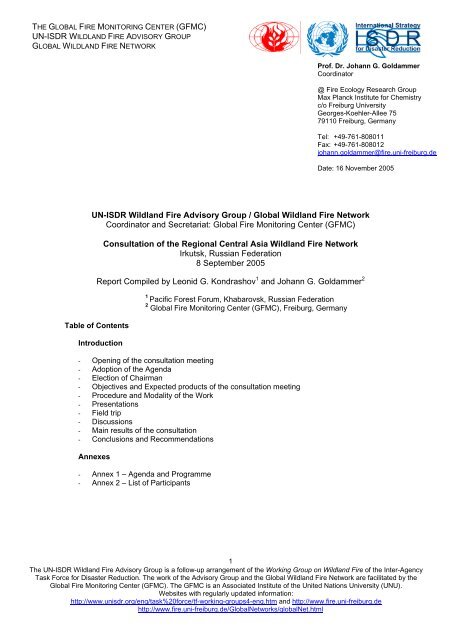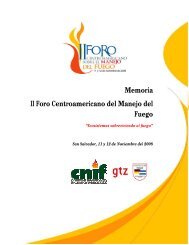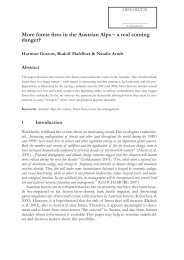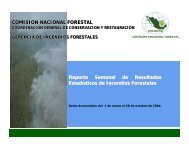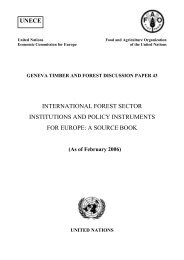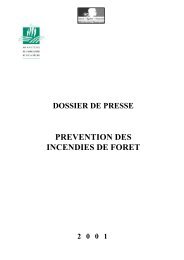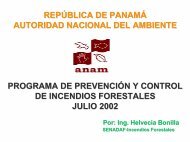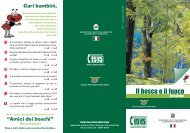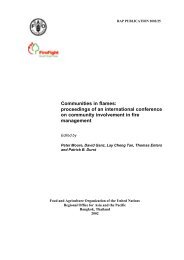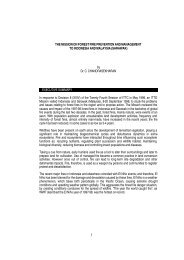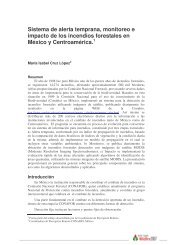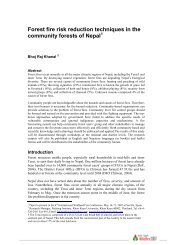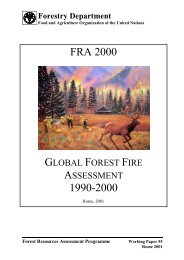Report of the meeting - The Global Fire Monitoring Center
Report of the meeting - The Global Fire Monitoring Center
Report of the meeting - The Global Fire Monitoring Center
You also want an ePaper? Increase the reach of your titles
YUMPU automatically turns print PDFs into web optimized ePapers that Google loves.
THE GLOBAL FIRE MONITORING CENTER (GFMC)<br />
UN-ISDR WILDLAND FIRE ADVISORY GROUP<br />
GLOBAL WILDLAND FIRE NETWORK<br />
Pr<strong>of</strong>. Dr. Johann G. Goldammer<br />
Coordinator<br />
@ <strong>Fire</strong> Ecology Research Group<br />
Max Planck Institute for Chemistry<br />
c/o Freiburg University<br />
Georges-Koehler-Allee 75<br />
79110 Freiburg, Germany<br />
Tel: +49-761-808011<br />
Fax: +49-761-808012<br />
johann.goldammer@fire.uni-freiburg.de<br />
Date: 16 November 2005<br />
UN-ISDR Wildland <strong>Fire</strong> Advisory Group / <strong>Global</strong> Wildland <strong>Fire</strong> Network<br />
Coordinator and Secretariat: <strong>Global</strong> <strong>Fire</strong> <strong>Monitoring</strong> <strong>Center</strong> (GFMC)<br />
Consultation <strong>of</strong> <strong>the</strong> Regional Central Asia Wildland <strong>Fire</strong> Network<br />
Irkutsk, Russian Federation<br />
8 September 2005<br />
<strong>Report</strong> Compiled by Leonid G. Kondrashov 1 and Johann G. Goldammer 2<br />
Table <strong>of</strong> Contents<br />
Introduction<br />
1 Pacific Forest Forum, Khabarovsk, Russian Federation<br />
2 <strong>Global</strong> <strong>Fire</strong> <strong>Monitoring</strong> <strong>Center</strong> (GFMC), Freiburg, Germany<br />
- Opening <strong>of</strong> <strong>the</strong> consultation <strong>meeting</strong><br />
- Adoption <strong>of</strong> <strong>the</strong> Agenda<br />
- Election <strong>of</strong> Chairman<br />
- Objectives and Expected products <strong>of</strong> <strong>the</strong> consultation <strong>meeting</strong><br />
- Procedure and Modality <strong>of</strong> <strong>the</strong> Work<br />
- Presentations<br />
- Field trip<br />
- Discussions<br />
- Main results <strong>of</strong> <strong>the</strong> consultation<br />
- Conclusions and Recommendations<br />
Annexes<br />
- Annex 1 – Agenda and Programme<br />
- Annex 2 – List <strong>of</strong> Participants<br />
1<br />
<strong>The</strong> UN-ISDR Wildland <strong>Fire</strong> Advisory Group is a follow-up arrangement <strong>of</strong> <strong>the</strong> Working Group on Wildland <strong>Fire</strong> <strong>of</strong> <strong>the</strong> Inter-Agency<br />
Task Force for Disaster Reduction. <strong>The</strong> work <strong>of</strong> <strong>the</strong> Advisory Group and <strong>the</strong> <strong>Global</strong> Wildland <strong>Fire</strong> Network are facilitated by <strong>the</strong><br />
<strong>Global</strong> <strong>Fire</strong> <strong>Monitoring</strong> <strong>Center</strong> (GFMC). <strong>The</strong> GFMC is an Associated Institute <strong>of</strong> <strong>the</strong> United Nations University (UNU).<br />
Websites with regularly updated information:<br />
http://www.unisdr.org/eng/task%20force/tf-working-groups4-eng.htm and http://www.fire.uni-freiburg.de<br />
http://www.fire.uni-freiburg.de/<strong>Global</strong>Networks/globalNet.html
Introduction<br />
<strong>The</strong> Consultation <strong>of</strong> <strong>the</strong> Regional Central Asia Wildland <strong>Fire</strong> Network was organized by UN-ISDR<br />
Wildland <strong>Fire</strong> Advisory Group / <strong>Global</strong> Wildland <strong>Fire</strong> Network, <strong>Global</strong> <strong>Fire</strong> <strong>Monitoring</strong> <strong>Center</strong>; and<br />
took place in East-Siberian Institute <strong>of</strong> Ministry <strong>of</strong> Internal Affairs, Irkutsk, Russian Federation, 8<br />
September 2005.<br />
Following <strong>the</strong> Regional Central Asian Forest Congress “Forest Policy: Problems and Solutions”<br />
(Bishkek, Kyrgyz Republic, 25-27 November 2004) which recommended <strong>the</strong> Central Asian<br />
countries to participate in <strong>the</strong> <strong>Global</strong> Wildland <strong>Fire</strong> Network, GFMC arranged <strong>the</strong> Consultation<br />
<strong>meeting</strong> with <strong>the</strong> Regional Central Asia Wildland <strong>Fire</strong> Network and Regional Nor<strong>the</strong>ast Asia<br />
Wildland <strong>Fire</strong> Network in Irkutsk, 8 September 2005. <strong>The</strong> Consultation <strong>meeting</strong> and regional<br />
network <strong>meeting</strong> have been sponsored by <strong>the</strong> German Foreign Office.<br />
<strong>The</strong> Regional Nor<strong>the</strong>ast Asia Wildland <strong>Fire</strong> Network has been established at a foundation <strong>meeting</strong> at<br />
<strong>the</strong> Korea Forest Research Institute, Seoul, Korea, 5-6 March 2004. In this <strong>meeting</strong> agreements were<br />
made between representatives <strong>of</strong> <strong>the</strong> countries <strong>of</strong> NE Asia belonging to <strong>the</strong> network (China, Japan,<br />
South Korea, Russian Federation) to initiate cooperation in wildland fire science and management<br />
under <strong>the</strong> umbrella <strong>of</strong> <strong>the</strong> UNISDR <strong>Global</strong> Wildland <strong>Fire</strong> Network.<br />
<strong>The</strong> Regional Central Asia Wildland <strong>Fire</strong> Network <strong>meeting</strong> is held in conjunction with <strong>the</strong><br />
International Conference “Forest and Steppe <strong>Fire</strong>s: Ignition, Spread, Extinguishing and<br />
Environmental Consequences”. <strong>The</strong> consultation is a response to needs for <strong>the</strong> fur<strong>the</strong>r<br />
international cooperation development.<br />
1. Opening <strong>of</strong> <strong>the</strong> consultation<br />
<strong>The</strong> consultation <strong>meeting</strong> was opened by Mr. Andrey Maslov, deputy director <strong>of</strong> <strong>the</strong> East-Siberian<br />
Institute <strong>of</strong> Ministry <strong>of</strong> Internal Affairs. He warmly greeted all <strong>the</strong> participants and thanked GFMC<br />
for organizing <strong>the</strong> Consultation <strong>meeting</strong>, which was intended to overview <strong>the</strong> forest fire situation in<br />
Central Asia and make contribution to fur<strong>the</strong>r development <strong>of</strong> bilateral and multilateral cooperation<br />
in forest fire management and adjoining countries. Moreover, he highlighted <strong>the</strong> importance <strong>of</strong><br />
elaborating common approach to forest fire management and <strong>Global</strong> <strong>Fire</strong> <strong>Monitoring</strong> <strong>Center</strong>’s<br />
continued support to countries in <strong>the</strong> region so that fire management implementation may become<br />
a reality. Fur<strong>the</strong>rmore, Mr. A. Maslov <strong>of</strong>fered his full support <strong>of</strong> international cooperation<br />
development.<br />
Pr<strong>of</strong>essor Dr. Johann G. Goldammer, Director <strong>of</strong> GFMC, on behalf on UN-ISDR welcomed <strong>the</strong><br />
participants and expressed <strong>the</strong> hope that <strong>the</strong> Consultation <strong>meeting</strong> would become <strong>the</strong> first step in<br />
supporting regional countries cooperation and <strong>the</strong>ir practical actions in forest fires management<br />
implementation. Dr. J. Goldammer also emphasized <strong>the</strong> global meaning <strong>of</strong> Wildland fire Networks<br />
as one <strong>of</strong> <strong>the</strong> most useful and reliable tools to report on progress towards sustainable forest<br />
management and to improve fire management activities over time. Ht explained <strong>the</strong> background <strong>of</strong><br />
<strong>the</strong> events and processes that led to this Consultation event. He highlighted that countries must<br />
promote a strong partnership in developing <strong>the</strong> system <strong>of</strong> forest fires management. Pr<strong>of</strong>.<br />
Goldammer also presented <strong>the</strong> objectives and expected products <strong>of</strong> <strong>the</strong> Consultation <strong>meeting</strong>.<br />
Dr. Leonid Kondrashov, Pacific Forest Forum President, described <strong>the</strong> important contributions that<br />
this Consultation <strong>meeting</strong> could make to national efforts in fire management arrangement and<br />
country national forest programmes.<br />
2. Adoption <strong>of</strong> <strong>the</strong> agenda<br />
<strong>The</strong> agenda was discussed and adopted by <strong>the</strong> participants (Annex 1)<br />
2<br />
<strong>The</strong> UN-ISDR Wildland <strong>Fire</strong> Advisory Group is a follow-up arrangement <strong>of</strong> <strong>the</strong> Working Group on Wildland <strong>Fire</strong> <strong>of</strong> <strong>the</strong> Inter-Agency<br />
Task Force for Disaster Reduction. <strong>The</strong> work <strong>of</strong> <strong>the</strong> Advisory Group and <strong>the</strong> <strong>Global</strong> Wildland <strong>Fire</strong> Network are facilitated by <strong>the</strong><br />
<strong>Global</strong> <strong>Fire</strong> <strong>Monitoring</strong> <strong>Center</strong> (GFMC). <strong>The</strong> GFMC is an Associated Institute <strong>of</strong> <strong>the</strong> United Nations University (UNU).<br />
Websites with regularly updated information:<br />
http://www.unisdr.org/eng/task%20force/tf-working-groups4-eng.htm and http://www.fire.uni-freiburg.de<br />
http://www.fire.uni-freiburg.de/<strong>Global</strong>Networks/globalNet.html
3. Election <strong>of</strong> chairman<br />
Dr. Leonid Kondrashov, President <strong>of</strong> Pacific Forest Forum, was elected Chairperson <strong>of</strong> <strong>the</strong><br />
Consultation Meeting.<br />
4. Objectives and expected products <strong>of</strong> <strong>the</strong> consultation<br />
<strong>The</strong> general objective <strong>of</strong> <strong>the</strong> <strong>meeting</strong> was to overview forest fire situation in Central Asia, support<br />
and develop bilateral and multilateral cooperation in forest fire management in Central Asia and<br />
adjoining countries, elaborate recommendations, participate in field trip to burned areas near<br />
Irkutsk city.<br />
<strong>The</strong> specific objectives were to:<br />
1. Invite experts on wildland fires from Russia and Central Asia to discuss forest fire<br />
problems and exchange experience.<br />
2. To identify among participants people and institutions interested in forest fire cooperation.<br />
3. Fur<strong>the</strong>r discuss <strong>the</strong> significance <strong>of</strong> forest fires in nature and society<br />
4. Discuss <strong>the</strong> forest fire problems in Russia, Republic <strong>of</strong> Korea, China, Mongolia and o<strong>the</strong>r<br />
countries.<br />
5. Discuss <strong>the</strong> process <strong>of</strong> monitoring fires and methods <strong>of</strong> <strong>the</strong>ir suppression<br />
6. Suggest recommendations in <strong>the</strong> field <strong>of</strong> fire management<br />
7. Identify sources <strong>of</strong> possible inside and outside technical and funding assistance and<br />
support to activities related to <strong>the</strong> introduction <strong>of</strong> fire management.<br />
Based on <strong>the</strong> general objective <strong>of</strong> <strong>the</strong> consultation <strong>meeting</strong> <strong>the</strong> expected results were:<br />
1. Analysis <strong>of</strong> forest fire situation in Central Asia and Nor<strong>the</strong>ast Asia countries<br />
2. Joint field trip to burned areas<br />
3. General guidelines to participants on how to go on implementing forest fire management<br />
4. Identification <strong>of</strong> cooperation directions.<br />
5. Procedure and modality <strong>of</strong> work<br />
<strong>The</strong> agenda and programme <strong>of</strong> <strong>the</strong> consultation <strong>meeting</strong> are provided in Annex 1. Twenty four<br />
participants from Mongolia (Ulanbaataar), Republic <strong>of</strong> Korea (Seoul), Germany (GFMC - Freiburg),<br />
Russian Federation (Pushkino, Irkutsk, Tomsk, Khabarovsk, Krasnoyarsk, Novosibirsk, Izhevsk,<br />
Gorno-Altaisk, Chita), who were mainly government <strong>of</strong>ficers, scientists and experts, attended <strong>the</strong><br />
consultation <strong>meeting</strong> (Annex 2).<br />
<strong>The</strong> sets <strong>of</strong> regional and national-level and international reports on forest fire problems served as<br />
<strong>the</strong> framework for discussions and recommendations (items 15-17 <strong>of</strong> this report). 1 <strong>The</strong> consultation<br />
<strong>meeting</strong> was conducted in a highly interactive participatory way and its programme was designed<br />
to ensure <strong>the</strong> optimal participation <strong>of</strong> all participants.<br />
6. Presentation No. 1: Introduction I – Clobal Wildland <strong>Fire</strong> Network/Regional Central Asia<br />
Wildland <strong>Fire</strong> Network (Johann G. Goldammer)<br />
<strong>The</strong> first presentation was intended to explain <strong>the</strong> use and advantages <strong>of</strong> <strong>Global</strong> Wildland <strong>Fire</strong><br />
Network as a tool needed to collect information, coordinate international efforts in managing fires.<br />
Regional Central Asia Wildland <strong>Fire</strong> Network’s goals and tasks were also presented.<br />
1<br />
<strong>The</strong> presentations will be published separately on <strong>the</strong> website <strong>of</strong> <strong>the</strong> Regional Central Asia Wildland <strong>Fire</strong> Network:<br />
http://www.fire.uni-freiburg.de/<strong>Global</strong>Networks/CentralAsia/CentralAsia.html<br />
3<br />
<strong>The</strong> UN-ISDR Wildland <strong>Fire</strong> Advisory Group is a follow-up arrangement <strong>of</strong> <strong>the</strong> Working Group on Wildland <strong>Fire</strong> <strong>of</strong> <strong>the</strong> Inter-Agency<br />
Task Force for Disaster Reduction. <strong>The</strong> work <strong>of</strong> <strong>the</strong> Advisory Group and <strong>the</strong> <strong>Global</strong> Wildland <strong>Fire</strong> Network are facilitated by <strong>the</strong><br />
<strong>Global</strong> <strong>Fire</strong> <strong>Monitoring</strong> <strong>Center</strong> (GFMC). <strong>The</strong> GFMC is an Associated Institute <strong>of</strong> <strong>the</strong> United Nations University (UNU).<br />
Websites with regularly updated information:<br />
http://www.unisdr.org/eng/task%20force/tf-working-groups4-eng.htm and http://www.fire.uni-freiburg.de<br />
http://www.fire.uni-freiburg.de/<strong>Global</strong>Networks/globalNet.html
7. Presentation No. 2: Introduction II – Regional Nor<strong>the</strong>ast Asia Wildland <strong>Fire</strong> Network<br />
(Leonid G. Kondrashov)<br />
<strong>The</strong> second presentation described <strong>the</strong> process <strong>of</strong> establishing Regional Nor<strong>the</strong>ast Asia Wildland<br />
<strong>Fire</strong> Network, its tasks, goals, participants, plans <strong>of</strong> work and cooperation.<br />
8. Presentation No. 3: Steppe and forest fires in Mongolia and problems <strong>of</strong> <strong>the</strong>ir<br />
suppression (Olzvoi Shinenchultem)<br />
<strong>The</strong> third presentation gave a short history <strong>of</strong> wildland fires in Mongolia, problems and experiences<br />
<strong>of</strong> fire suppression under local conditions.<br />
9. Presentation No. 4: <strong>The</strong> fire situation in Nor<strong>the</strong>rn China (Shu Lifu)<br />
<strong>The</strong> fourth presentation explained what have been <strong>the</strong> tendencies and perspectives <strong>of</strong> fire<br />
management in China, in Nor<strong>the</strong>rn China in Particular. It also emphasized <strong>the</strong> technical means to<br />
suppress fires in China.<br />
10. Presentation No. 5 : National fire report <strong>of</strong> Russia with emphasis on recent<br />
organizational and structural changes Eduardo P. Davidenko)<br />
<strong>The</strong> fifth presentation presented <strong>the</strong> analysis <strong>of</strong> fire situation in 2005 in Russia, revealed <strong>the</strong> main<br />
plans in structural changes <strong>of</strong> forest protection service including Avialesookhrana.<br />
11. Presentation No. 6: <strong>The</strong> fire season in Republic <strong>of</strong> Korea (Kim, Dong Hyun)<br />
<strong>The</strong> sixth presentation considered <strong>the</strong> experience <strong>of</strong> South Korea in fire extinguishing, new<br />
equipment and possibilities <strong>of</strong> its utilization.<br />
12. Presentation No. 7: <strong>The</strong> fire situation in <strong>the</strong> Far East <strong>of</strong> Russia (Leonid G. Kondrashov)<br />
<strong>The</strong> seventh presentation described forest fire season, methods and structure <strong>of</strong> regional fire<br />
fighting.<br />
13. Presentation No. 8: Wildfire danger rating in natural conditions (Tatiana M. S<strong>of</strong>ronova)<br />
<strong>The</strong> eighth presentation gave a notion on new practical approach to fire danger rating and its use<br />
results.<br />
In general all <strong>the</strong>se presentations set <strong>the</strong> framework and scenery <strong>of</strong> <strong>the</strong> consultation <strong>meeting</strong> and<br />
provided information on international fire management and fire suppression goals and tasks and<br />
recommendations elaboration.<br />
14. Field trip to burned areas near Irkutsk city<br />
On 9 September <strong>the</strong> local Avialesookhrana subdivision <strong>of</strong> Irkutsk region arranged a visit <strong>of</strong><br />
participants to local fire patches. <strong>The</strong> participants received information on type <strong>of</strong> fires, <strong>the</strong>ir<br />
number and covered area, witnessed <strong>the</strong> consequences <strong>of</strong> fires, were introduced <strong>the</strong> possibilities<br />
<strong>of</strong> local firemen to suppress fires. <strong>The</strong> fire on <strong>the</strong> site which was visited happened in July 2003. It<br />
was originated by lightning and lasted several days. <strong>The</strong> people could not stop <strong>the</strong> fire it crossed<br />
<strong>the</strong> forest road <strong>of</strong> 20 m width. Wea<strong>the</strong>r created <strong>the</strong> extreme fire danger. Air temperature was more<br />
than 30°C, strong wind and lack <strong>of</strong> precipitation. <strong>The</strong> fire burned several country houses in <strong>the</strong><br />
nearby village. <strong>The</strong> area affected was 16 000 ha. Half <strong>of</strong> <strong>the</strong> area was covered by crown fire. <strong>The</strong><br />
major species affected was pine (Pinus sylvestris) <strong>of</strong> different age. During <strong>the</strong> field trip <strong>the</strong><br />
participants discussed <strong>the</strong> problems <strong>of</strong> post-fire forest recovery and gave recommendations.<br />
4<br />
<strong>The</strong> UN-ISDR Wildland <strong>Fire</strong> Advisory Group is a follow-up arrangement <strong>of</strong> <strong>the</strong> Working Group on Wildland <strong>Fire</strong> <strong>of</strong> <strong>the</strong> Inter-Agency<br />
Task Force for Disaster Reduction. <strong>The</strong> work <strong>of</strong> <strong>the</strong> Advisory Group and <strong>the</strong> <strong>Global</strong> Wildland <strong>Fire</strong> Network are facilitated by <strong>the</strong><br />
<strong>Global</strong> <strong>Fire</strong> <strong>Monitoring</strong> <strong>Center</strong> (GFMC). <strong>The</strong> GFMC is an Associated Institute <strong>of</strong> <strong>the</strong> United Nations University (UNU).<br />
Websites with regularly updated information:<br />
http://www.unisdr.org/eng/task%20force/tf-working-groups4-eng.htm and http://www.fire.uni-freiburg.de<br />
http://www.fire.uni-freiburg.de/<strong>Global</strong>Networks/globalNet.html
According <strong>the</strong> information <strong>of</strong> <strong>the</strong> chief forester, <strong>the</strong>y need more financial resources and even<br />
attraction <strong>of</strong> international sponsors, taking into account <strong>the</strong> value <strong>of</strong> this forest site which belongs<br />
to a protection area for <strong>the</strong> Baikal lake.<br />
15. Discussions<br />
<strong>The</strong> presentations, remarks and questions were fur<strong>the</strong>r discussed in <strong>the</strong> second half <strong>of</strong> <strong>the</strong><br />
consultation <strong>meeting</strong>.<br />
<strong>The</strong> following is a summary <strong>of</strong> <strong>the</strong> outcomes <strong>of</strong> <strong>the</strong> major points discussed during <strong>the</strong> consultation<br />
<strong>meeting</strong>:<br />
1. Countries <strong>of</strong> Central Asia should take into account <strong>the</strong> experience <strong>of</strong> fire suppression<br />
accumulated in Russia and Nor<strong>the</strong>ast Asia states.<br />
2. <strong>The</strong>re is a need to ensure and streng<strong>the</strong>n national capacities for efficient and timely fire<br />
fighting.<br />
3. Central Asian countries should create a mechanism <strong>of</strong> joint work on fire management and<br />
information exchange<br />
4. <strong>The</strong>re is a need to harmonize definitions and terms related to fire management<br />
5. It is expected that after <strong>the</strong> consultation <strong>meeting</strong> participants will have a better<br />
understanding <strong>of</strong> fire situation in Central and Nor<strong>the</strong>ast Asia<br />
6. Participants requested assistance and fur<strong>the</strong>r cooperation from GFMC, UN-ISDR, o<strong>the</strong>r<br />
international organizations and <strong>the</strong> donor community.<br />
7. It was recommended that <strong>the</strong> Russian Federal Forestry Agency should include in its plan<br />
(a) <strong>the</strong> improvement <strong>of</strong> forest fire danger rating on <strong>the</strong> basis <strong>of</strong> scientific approach<br />
elaborated by Sukachev Forest Institute, Tomsk State University, Hydrometeorological<br />
Service, etc., and taking into account international achievements and practical experience<br />
<strong>of</strong> Avialesookhrana and <strong>the</strong> East Siberian Institute <strong>of</strong> <strong>the</strong> Russian Ministry <strong>of</strong> Internal<br />
Affairs (Irkutsk); and (b) to create step-by-step a Russian system <strong>of</strong> fire behaviour and<br />
consequences prediction using developments <strong>of</strong> <strong>the</strong> Sukachev Institute for Forest and<br />
international experience<br />
<strong>The</strong>se proposals, describing <strong>the</strong> “road forward” in <strong>the</strong> region, were discussed and agreed upon by<br />
<strong>the</strong> participants <strong>of</strong> <strong>the</strong> consultation <strong>meeting</strong>. <strong>The</strong>se proposals identify and recommend actions that<br />
countries need to follow in order to improve forest fire management and international cooperation<br />
taking into account countries’ overall ecological, socio-economic, political and cultural conditions.<br />
16. Main results <strong>of</strong> <strong>the</strong> consultation<br />
This report summarizes <strong>the</strong> results achieved by <strong>the</strong> participants from Russia, Mongolia, China,<br />
Republic <strong>of</strong> Korea. It presents <strong>the</strong> outcomes that can be used for fur<strong>the</strong>r development <strong>of</strong><br />
international cooperation and forest fire management. One <strong>of</strong> <strong>the</strong> important steps is <strong>the</strong><br />
organization <strong>of</strong> <strong>the</strong> follow-up work at national level in each country. In connection with <strong>the</strong><br />
restructuring <strong>of</strong> Central Asia economies <strong>the</strong>re is a hope <strong>of</strong> international institutions support.<br />
<strong>The</strong> major steps in cooperation must be carried out on <strong>the</strong> national level including annual <strong>meeting</strong>s<br />
<strong>of</strong> <strong>the</strong> Regional Wildfire Networks, joint projects implementation. <strong>The</strong> participants discussed <strong>the</strong><br />
significance <strong>of</strong> forest fires in nature and society, forest fire problems in Russia, Republic <strong>of</strong> Korea,<br />
China, Mongolia and o<strong>the</strong>r countries, <strong>the</strong> process <strong>of</strong> monitoring fires and methods <strong>of</strong> <strong>the</strong>ir<br />
suppression, identified sources <strong>of</strong> possible inside and outside technical and funding assistance<br />
and support to activities related to <strong>the</strong> introduction <strong>of</strong> fire management, made a joint field trip to<br />
burned areas.<br />
In general, all <strong>the</strong> participants showed <strong>the</strong>ir enthusiasm and support an fully agreed that <strong>the</strong> topic<br />
discussion was <strong>of</strong> utmost importance for <strong>the</strong> protection, conservation and management <strong>of</strong> <strong>the</strong><br />
forest resources in central Asia. <strong>The</strong>y expressed <strong>the</strong>ir appreciation to GFMC, Germany Foreign<br />
Office for <strong>the</strong> opportunity granted to <strong>the</strong>m to attend <strong>the</strong> consultation <strong>meeting</strong>. <strong>The</strong> discussions were<br />
5<br />
<strong>The</strong> UN-ISDR Wildland <strong>Fire</strong> Advisory Group is a follow-up arrangement <strong>of</strong> <strong>the</strong> Working Group on Wildland <strong>Fire</strong> <strong>of</strong> <strong>the</strong> Inter-Agency<br />
Task Force for Disaster Reduction. <strong>The</strong> work <strong>of</strong> <strong>the</strong> Advisory Group and <strong>the</strong> <strong>Global</strong> Wildland <strong>Fire</strong> Network are facilitated by <strong>the</strong><br />
<strong>Global</strong> <strong>Fire</strong> <strong>Monitoring</strong> <strong>Center</strong> (GFMC). <strong>The</strong> GFMC is an Associated Institute <strong>of</strong> <strong>the</strong> United Nations University (UNU).<br />
Websites with regularly updated information:<br />
http://www.unisdr.org/eng/task%20force/tf-working-groups4-eng.htm and http://www.fire.uni-freiburg.de<br />
http://www.fire.uni-freiburg.de/<strong>Global</strong>Networks/globalNet.html
very active and provided some interesting inputs on this issue. A special thanks were expressed to<br />
<strong>the</strong> hosting organization – <strong>the</strong> East Siberian Institute <strong>of</strong> Ministry <strong>of</strong> Internal Affairs.<br />
17. Conclusions and recommendations<br />
1. Countries <strong>of</strong> <strong>the</strong> region must unite <strong>the</strong>ir efforts and resources to combat <strong>the</strong> uncontrolled<br />
forest fires and prevent extreme damage.<br />
2. It was noted that results from such <strong>meeting</strong>s do not always reach <strong>the</strong> decision-makers<br />
and, when <strong>the</strong>y do, <strong>the</strong> necessary support from higher forestry authorities is not always<br />
forthcoming.<br />
3. <strong>Fire</strong> danger ratings are useful tools assisting in fire fighting and need <strong>the</strong>ir fur<strong>the</strong>r<br />
development and introduction into practice.<br />
4. Central Asian countries should continue to streng<strong>the</strong>n <strong>the</strong>ir commitment to promote <strong>the</strong><br />
joint cooperation<br />
5. National forest fire programmes could greatly enhance implementation fire management.<br />
6. Education and awareness related to forest fires should be a continuing campaign by<br />
governments in order that <strong>the</strong>ir implementation becomes a reality in <strong>the</strong> future.<br />
7. <strong>The</strong>re is a need to continue supporting efforts to better define terms and definitions related<br />
to fire management.<br />
8. Increased international cooperation and help from GFMC is necessary to get good results.<br />
9. Participants recommended that this report <strong>of</strong> this consultation <strong>meeting</strong> be published and<br />
distributed among participants and o<strong>the</strong>r interested parties<br />
10. <strong>The</strong> consultation <strong>meeting</strong> was well organized by <strong>the</strong> East Siberian Institute and Irkutsk<br />
subdivision <strong>of</strong> Avialesookhrana, thanks to full support given by <strong>the</strong> German Foreign Office<br />
and <strong>the</strong> GFMC, participants considered it a success. <strong>The</strong> usefulness and necessity <strong>of</strong><br />
future consultation <strong>meeting</strong>s was also underlined.<br />
6<br />
<strong>The</strong> UN-ISDR Wildland <strong>Fire</strong> Advisory Group is a follow-up arrangement <strong>of</strong> <strong>the</strong> Working Group on Wildland <strong>Fire</strong> <strong>of</strong> <strong>the</strong> Inter-Agency<br />
Task Force for Disaster Reduction. <strong>The</strong> work <strong>of</strong> <strong>the</strong> Advisory Group and <strong>the</strong> <strong>Global</strong> Wildland <strong>Fire</strong> Network are facilitated by <strong>the</strong><br />
<strong>Global</strong> <strong>Fire</strong> <strong>Monitoring</strong> <strong>Center</strong> (GFMC). <strong>The</strong> GFMC is an Associated Institute <strong>of</strong> <strong>the</strong> United Nations University (UNU).<br />
Websites with regularly updated information:<br />
http://www.unisdr.org/eng/task%20force/tf-working-groups4-eng.htm and http://www.fire.uni-freiburg.de<br />
http://www.fire.uni-freiburg.de/<strong>Global</strong>Networks/globalNet.html
ANNEXES<br />
Annex 1 – Agenda and programme<br />
8 September 2005<br />
0900-0910 Opening <strong>of</strong> <strong>the</strong> Meeting<br />
Adoption <strong>of</strong> <strong>the</strong> Agenda<br />
Election <strong>of</strong> Chairman<br />
Introduction <strong>of</strong> <strong>the</strong> Objectives and <strong>the</strong> expected products <strong>of</strong> <strong>the</strong><br />
consultation<br />
0910-0930 J.G. Goldammer. <strong>Global</strong> Wildland <strong>Fire</strong> Network / Regional Central Asia<br />
Wildland Wire Network<br />
0930-0950 L.G. Kondrashov. Regional Nor<strong>the</strong>ast Asia Wildland Wire Network<br />
0950-1010 Olzvoi Shinenchultem. Forest and Steppe fires in Mongolia and problems<br />
<strong>of</strong> <strong>the</strong>ir suppression<br />
1010-1030 C<strong>of</strong>fee-break<br />
1030-1100 Shu Lifu. <strong>The</strong> fire situation in Nor<strong>the</strong>rn China<br />
1100-1130 E.P. Davidenko. National fire report Russia with emphasis on recent<br />
organizational and structural changes<br />
1130-1200 Kim D.H. <strong>The</strong> fire situation in South and North Korea<br />
1200-1230 L.G. Kondrashov. <strong>The</strong> fire situation in <strong>the</strong> Far East <strong>of</strong> Russia<br />
1230-1300 N.M. S<strong>of</strong>ronova. Wildfire Danger rating in Natural Conditions<br />
1300-1400 Lunch break<br />
1400-1730 Regional Network Consultation<br />
Discussion and conclusions<br />
9 September 2005<br />
Field trip<br />
Annex 2 – List <strong>of</strong> participants<br />
7<br />
<strong>The</strong> UN-ISDR Wildland <strong>Fire</strong> Advisory Group is a follow-up arrangement <strong>of</strong> <strong>the</strong> Working Group on Wildland <strong>Fire</strong> <strong>of</strong> <strong>the</strong> Inter-Agency<br />
Task Force for Disaster Reduction. <strong>The</strong> work <strong>of</strong> <strong>the</strong> Advisory Group and <strong>the</strong> <strong>Global</strong> Wildland <strong>Fire</strong> Network are facilitated by <strong>the</strong><br />
<strong>Global</strong> <strong>Fire</strong> <strong>Monitoring</strong> <strong>Center</strong> (GFMC). <strong>The</strong> GFMC is an Associated Institute <strong>of</strong> <strong>the</strong> United Nations University (UNU).<br />
Websites with regularly updated information:<br />
http://www.unisdr.org/eng/task%20force/tf-working-groups4-eng.htm and http://www.fire.uni-freiburg.de<br />
http://www.fire.uni-freiburg.de/<strong>Global</strong>Networks/globalNet.html
REGIONAL CENTRAL ASIA WILDLAND FIRE NETWORK CONSULTATION<br />
IRKUTSK, RUSSIAN FEDERATION, 8 SEPTEMBER 2005<br />
Name Affiliation Position<br />
LIST OF PARTICIPANTS<br />
Address Phone / Fax / E-mail<br />
1 Goldammer <strong>Global</strong> <strong>Fire</strong> <strong>Monitoring</strong> <strong>Center</strong> Director, Pr<strong>of</strong>essor<br />
Georges-Koehler-Alle 75<br />
+49-761-808011<br />
Johann Georg (GFMC)<br />
Coordinator, UN-ISDR Wildland D-79110 Freiburg<br />
+49-761-808012<br />
<strong>Fire</strong> Advisory Group / <strong>Global</strong> Germany<br />
johann.goldammer@fire.uni-<br />
Wildland <strong>Fire</strong> Network<br />
freiburg.de<br />
2 Kondrashov Pacific Forest Forum President 680 000, Khabarovsk <strong>Center</strong> +7-4212-492886;<br />
Leonid G.<br />
PO Box 4/5<br />
Russia<br />
malero@rambler.ru<br />
3 Lee, Kyoung il Korea Forest Service<br />
Director 920Dunsan-dong, Seo-gu,<br />
+82-424814250<br />
Daejeon, 302-701<br />
+82-424814260<br />
Korea<br />
leeki21@foa.go.kr<br />
4 Kim, Dong Korea Forest Research Researcher Cheonangni 2 dong<br />
+82-2-9612767<br />
Hyun<br />
Institute<br />
dong dae Mun gu, Seoul, Korea k3d2h1@foa.go.kr<br />
5 Enkhtur, GTZ <strong>of</strong> Mongolia Project Officer for forest<br />
Ulanbaataar<br />
+976-11312282-13<br />
Dagva<br />
management<br />
Mongolia<br />
enhktur@gtz-mongolia.org<br />
6 Olzvoi<br />
National Emergency<br />
Director, <strong>Fire</strong> Research <strong>Center</strong> Ulanbataar<br />
+976-11263577<br />
Shinenchultem Management Agency<br />
<strong>of</strong> Disaster Protection Training Mongolia<br />
+976-11322307<br />
and Research Institute<br />
olzvoi@emer.pmis.gov.mn<br />
7 Tsetsenbat National Emergency<br />
Engineer, National Emergency Ulanbataar<br />
+976-11262539<br />
Demberel Management Agency<br />
Management Agency<br />
Mongolia<br />
tsetsenbat@emer.pmis.gov.mn<br />
8 Chuluunbaatar, Institute <strong>of</strong> Botany Researcher Mongolia Jukov Avenue-77, +976+11457006<br />
Tsevee-Oiroy<br />
Ulanbaatar 210351<br />
+976+11451837<br />
Mongolia<br />
ts-chukaa@hotmail.com<br />
9 Volokitina V.N. Sukachev Institute <strong>of</strong> Leading scientific researcher; Krasnoyarsk 660036<br />
+7-3912-494651<br />
Alexandra Forest SB RAS; Siberian Pr<strong>of</strong>essor<br />
Akademgorodok<br />
+7-3912-433686<br />
Vitalievna Technological University<br />
P.O. Box 8743<br />
Russia<br />
volokit@ksc.krasn.ru<br />
10 Shmakov Institute <strong>of</strong> Chemical Kinetics Senior researcher 630090, Novosibirsk, 3,<br />
+7-383-3333346<br />
Andrey and burning<br />
Institutskaya Street<br />
+7-383-3307350<br />
Gennadievich<br />
Russia<br />
shmakov@kinetics.nsc.ru<br />
11 S<strong>of</strong>ronov Mark V.N. Sukachev Institute <strong>of</strong> Leading scientific researcher; Krasnoyarsk 660036<br />
+7-3912-494651<br />
Andrianovich Forest SB RAS; Siberian Pr<strong>of</strong>essor<br />
Akademgorodok<br />
+7-3912-433686<br />
Technological University<br />
P.O. Box 8743<br />
Russia<br />
institute@forest,akadem.ru<br />
12 Aksakov Alexei Research Institute <strong>of</strong> Nature Researcher 426034, Izhevsk<br />
+7-3412-753831<br />
Vladimirovich and Technogenic<br />
1, Universitetskaya Street<br />
aalex@wing.uni.udm.ru<br />
Catastrophes<br />
Build. 6, Office 309<br />
Udmurtia State University<br />
Russia
13<br />
14<br />
15<br />
16<br />
17<br />
Knyazhin<br />
Victor<br />
Stanislavovich<br />
Krechetova<br />
Svetlana<br />
Yurievna<br />
Burasov Dmitry<br />
Mikhailovich<br />
Basalaev<br />
Anatoly<br />
Egorovich<br />
Kuzin<br />
Alexander<br />
Yakovlevich<br />
18 Lezhenin<br />
Anatoly<br />
19<br />
20<br />
Alexandrovich<br />
Daneev Alexei<br />
Vasilievich<br />
Zhigalov<br />
Nikolai<br />
Yurievich<br />
21 Chernov<br />
Anatoly<br />
22<br />
23<br />
24<br />
Victorovich<br />
Maslov Andrey<br />
Semenovich<br />
Davidenko<br />
Edward<br />
Pavlovich<br />
S<strong>of</strong>ronova<br />
Tatiana<br />
Markovna<br />
Research Institute <strong>of</strong> Nature<br />
and Technogenic<br />
Catastrophes<br />
Udmurtia State University<br />
Gorno-Altayski State<br />
University<br />
Engineer 426034, Izhevsk<br />
1, Universitetskaya Street<br />
Build. 6, Office 309<br />
Russia<br />
Postgraduate 640000, Gorno-Altaisk City<br />
Sotsialisticheskaya Street, 14<br />
Office 307<br />
Russia<br />
Tomsk State University Junior researcher 634050, Tomsk<br />
36, Lenin Street<br />
Management <strong>of</strong>fice on<br />
catastropes warning and<br />
emergency, Chita Region<br />
Russia<br />
Consultant 642200, Chita<br />
Bogomaiskogo, 23<br />
Russia<br />
Tomsk State University Pr<strong>of</strong>essor 634050, Tomsk<br />
36, Lenin Street<br />
Institute <strong>of</strong> Ma<strong>the</strong>matics and<br />
Ma<strong>the</strong>matical Geography<br />
East-Siberian Institute <strong>of</strong><br />
Ministry <strong>of</strong> Internal Affairs<br />
East-Siberian Institute <strong>of</strong><br />
Ministry <strong>of</strong> Internal Affairs<br />
East-Siberian Institute <strong>of</strong><br />
Ministry <strong>of</strong> Internal Affairs<br />
East-Siberian Institute <strong>of</strong><br />
Ministry <strong>of</strong> Internal Affairs<br />
National Aerial Forest <strong>Fire</strong><br />
<strong>Center</strong> <strong>of</strong> Russia<br />
Avialesookhrana<br />
Siberian State Technological<br />
University<br />
25 Shu Lifu Wildland <strong>Fire</strong> Group, Institute<br />
<strong>of</strong> Forest Protection<br />
Russia<br />
Senior researcher 630099, Novosibirsk<br />
6,Lavrentiev Prospekt<br />
Russia<br />
Faculty head 664074, Irkutsk<br />
110, Lermontov Street<br />
Russia<br />
Institute deputy head 664074, Irkutsk<br />
110, Lermontov Street<br />
Russia<br />
Institute head 664074, Irkutsk,<br />
110, Lermontov Street<br />
Russia<br />
Institute deputy head 664074, Irkutsk<br />
110, Lermontov Street<br />
Russia<br />
Department head 141200 Pushkino<br />
Gorkogo St. 20<br />
Russia<br />
PhD student 660049, Krasnoyarsk<br />
Prospekt Mira 82<br />
Russia<br />
Group Leader Behind <strong>the</strong> Summer Palace<br />
Beijing, 100091<br />
China<br />
+7-3412-753831<br />
mild@wing.uni.udm.ru<br />
ksy@gasu.ru<br />
+7-3822-529669<br />
fire19952004@mail.ru<br />
3211728<br />
2548359<br />
+7-3822-529669<br />
fire19952004@mail.ru<br />
+7-3832-3306450<br />
lezhenin@ommfao.sscc.ru<br />
+7-3952-394749<br />
daneev@mail.ru<br />
+7-3952-387775<br />
nik@esi.irk.ru<br />
+7-3952-394989<br />
+7-3952-387769<br />
+7-095-993-3430<br />
+7-096-532-9220<br />
eddav@space.ru<br />
volokit@ksc.krasn.ru<br />
Ph/fax:<br />
+86-1062889515<br />
shulf@mail.forestry.ac.cn


